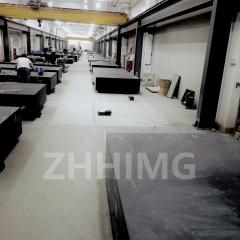Precision black granite parts are used in a variety of industries such as aerospace, automotive, and optical for their high accuracy, stability, and durability. However, like any other manufacturing process, precision black granite parts can have defects that affect their quality and performance.
One potential defect of precision black granite parts is surface roughness. During the machining process, the cutting tool may leave marks or scratches on the surface of the granite, resulting in an uneven and rough finish. Surface roughness can affect the appearance of the part and its ability to slide or make contact with other surfaces.
Another defect of precision black granite parts is flatness. Granite is known for its high flatness and stability, but manufacturing and handling can cause the part to warp or bend, resulting in an irregular surface. Flatness defects can affect the accuracy of the measurements taken on the part and may cause problems in the assembly of the final product.
Cracks can also be a defect in precision black granite parts. Cracks can occur during the manufacturing process, assembly, or handling of the part. They can affect the strength and stability of the part and may result in failure during use. Proper inspection and testing can help detect and prevent parts with cracks from being used in final products.
Another common defect of precision black granite parts is incorrect dimensions. Granites are often machined to high tolerances, and any deviation from the specified dimensions can result in a non-conformant part. Incorrect dimensions may result in fitment issues or cause the part to fail during testing or use.
Because precision black granite parts are often used in sensitive industries such as automotive and aerospace, defects can have severe consequences. To minimize defects, manufacturers must ensure accurate machining and handling of the parts, and proper inspection and testing should be carried out during the manufacturing and assembly process.
In conclusion, precision black granite parts can have defects such as surface roughness, flatness, cracks, and incorrect dimensions. However, these defects can be minimized through proper handling, machining, and inspection processes. Ultimately, the goal should be to achieve high-quality precision black granite parts that meet the highest standards of accuracy, stability, and durability.
Post time: Jan-25-2024

